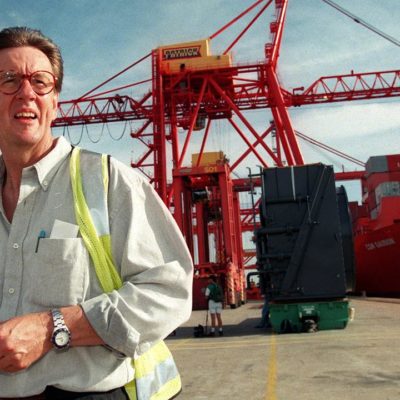Shipping group Qube Holdings will give back $17m in JobKeeper subsidies but pockets $13.5m and some fancy executive bonuses despite its revenue rising strongly. How did it pull this off? Callum Foote investigates how the Liberal Party-linked Qube gamed the Tax Office.
BonusKeeper
Qube Holdings paid out the largest executive dividends of any company that received the Jobkeeper subsidy – some $2.78 million. The company’s retiring CEO Maurice James was granted $2 million.
There is little evidence Qube, worth $5 billion, was eligible for Jobkeeper. A revenue drop of more than 50 per cent was required to be eligible. However, at the end of June 2020, Qube reported that its underlying revenue had increased 9 percent over the same period in 2019.
In the 2020 financial year (July 2019 to June 2020), Qube Holdings’ revenue was $1.9 billion.
As December 2019, halfway through the 2020 financial year, Qube Holdings had already made $957.3 million, just over half of Qube’s total profits for the year.
This means Qube saw nearly the exact same revenue in the two halves of FY 2020, despite supposedly being affected by Covid for four months in 2020.
How did Qube qualify for JobKeeper?
In an affidavit signed by Michael Sousa, a director at Qube Ports & Bulk, he says that he advised union officer Warren Smith that as of April 14 Qube was “working with Government to determine our eligibility but we did not believe that we met the criteria at that point. As a result, I explained the importance of engaging in the review.”
However, “On 16 April 2020, after lengthy discussions with the Department of Treasury and the Australian Taxation Office, it was determined that Qube would be eligible for the subsidy from April 2020 (meaning that Qube could claim Jobkeeper payments).”

It is unclear what discussions enabled Qube to become eligible for the Jobkeeper subsidy.
The ATO refused to discuss how Qube qualified for Jobkeeper. An ATO spokesperson simply stated that “entities were required to satisfy a decline in turnover conditions” and that “some entities were also able to use a modified test and alternative tests as prescribed by the Commissioner, to meet the turnover requirement”.
The ATO is “aware that some companies have been paying dividends and executive bonuses whilst in receipt of Jobkeeper”. However, “such payments do not impact a company’s eligibility for Jobkeeper”.
Numerous union officers have reported to Michael West Media that during a bargaining meeting held in Sydney last year, Michael Sousa stated that he had threatened to shut down seven Australian ports if Qube wasn’t awarded the JobKeeper subsidy.
Qube has refused to comment on Michael Sousa but denied using a modified turnover test to gain the Jobkeeper subsidy.
Wharfie enemy no. 1
Qube management and the MUA have had a long and adversarial relationship centred around its founder and wharfie-enemy No. 1 Chris Corrigan.

Chris Corrigan during the Waterfront dispute 1998
Corrigan was a central player in the 1998 waterfront dispute where, as the managing director of Patrick Holdings, he attempted to sack the company’s unionized workforce over workplace disputes.
Corrigan and his fellow Patrick executives created Qube Holdings following the hostile takeover of Patrick Holdings by Toll Holdings in 2006.
Created as a vehicle to retake control of Patrick Holdings, Qube now owns half of Patrick’s operations. The other half belongs to international investor Brookfield Holdings.
Chris Corrigan and the Qube executive have strong ties with the Liberal party dating back to the Howard government era.
The connection remains strong despite Corrigan’s retirement. Maurice James was one of only four people on the federal government’s National Freight and Supply Chain Expert Panel, set up in 2017 and tasked with identifying key priorities for the National Freight and Supply Chain Strategy.
Scott Morrison publicly condemned industrial action taken by Qube employees at the start of the pandemic.
At the time, Morrison wouldn’t rule out military intervention to settle the “militant” and “extortionate” dispute, claiming falsely that 40 ships were “lined up” outside Port Botany.
Meanwhile, industrial action taken by workers at freight company DP World, which has only just culminated in an enterprise bargaining agreement being signed on Tuesday, received no attention from the Prime Minister.
Brad Dunn, who worked for DP World for 25 years and led union negotiations for the MUA, said he found the different responses “interesting”.
According to Dunn, Qube workers had taken industrial action for just four hours to hold a meeting informing union members that negotiations had broken down before Morrison got involved.
Yet industrial action taken by DP World workers, which consisted of “multiple 24-hour walk-offs and other industrial action over 18 months received media silence”.
Payback Jobkeeper
Despite posting $940 million in revenue in their FY21 half-yearly earnings report, Qube is now trying to force some 595 wharfies to ‘pay back’ Qube a portion of their Jobkeeper subsidy through unpaid hours if the worker, for whatever reason, did not work their full hours whilst receiving the subsidy.
As is pointed out to Michael West Media by an MUA spokesperson, wharf work is seasonal and hours depend on when ships arrive at port to be processed.
Qube’s HR department explicitly told employees in a companywide email that: “The unworked portion of the guarantee up to the JobKeeper amount which is $1,500 will not have to be repaid.”
Qube management argues that its wharfies were given a Jobkeeper payment for 80 hours of work in a 28-day period. It remains to be seen how much repayment Qube are seeking, the result of which could allow them to claw back the $17 million in JobKeeper payments they have just returned to the government.
A similar dispute between unions and Qantas is before the courts. The MUA is awaiting the result of that legal action before it takes court action.
Callum Foote was a reporter for Michael West Media for four years.

